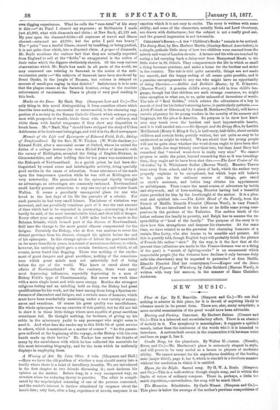CHILDREN'S Boosts.—A few " Children's Books " remain to be
noticed. The Daisy Root, by Mrs. Herbert Martin (Sunday-School Association), is a simple, pathetic little story of how two children were rescued from the misery and want of London streets. A farmer and his wife are touched by seeing a lad carrying back a daisy-root from Hampstead Heath to his little sister in St. Giles's. They compassionate the life in which so small a thing becomes precious, and make a home for the brother and sister in the country. The tale is told quite naturally, things are not made too smooth, and the happy ending of all seems quite possible, and is a genuine encouragement to any one who might have an opportunity of doing likewise.—Dobbie and Dobbie's Master, by N. D'Anvers. (Marcus Ward.) A genuine child's story, and told in true child's lan- guage, though but that children are such strange creatures, we might take exception to what are, to us, quite unheard-of inversions of words. The tale of " Real Debbie," which relates the adventures of a boy in search of food for his father's starving horse, is particularly pathetic.— Little Friends at Glenwood, by Joanna H. Matthews (Nisbet), will,have a certain piquancy for its young readers in the novelty of its scenery and language, for the place is America. Its purpose is to show how kind- ness may touch even the hardest and most impenetrable hearts, and it is well carried out.—Sir Spangle and the Dingy Hen, by Lestitia McClintock (Henry S. King & Co.), is half-story, half-fable, about certain children and certain birds, prettily written, but not quite as easy to be understood as might be wished. We are afraid that the young people will not be quite clear whether the wood-doves ought to have been shot or no. Little Joe wept bitterly over their fate, but then Aunt Mary had remarked that " stewed wood-dove is really very nice." We cannot propose to settle the point, beyond remarking that as it was breeding- time, they ought not to have been shot then.—The Last Cruise of the 'Ariadne,' by S. Whitehurst Sadler (Marcus Ward). Maurice Trevor runs away from school, and by a piece of luck, which the author very properly explains to be exceptional, but which boys will believe to be quite in the ordinary course of things, gets rated as clerk's assistant, and before long obtains his appointment as midshipman. Then comes the usual course of adventure by battle and shipwreck, and of love-making, Maurice having had a beautiful sister provided for him by the forethought of the author. It is a plea- sant and spirited tale. —The Little Head of the Family, from the French of Madlle. Zdnaide Fleuriot (Marcus Ward), is very French indeed. We are introduced to the hero as he drills some young com- panions in the gardens of the Tuileries. The sudden death of the father reduces the family to poverty, and Ralph has to assume the re- sponsibility of " head of the family." The purpose of the story is to show how this strengthens and deepens his character. At the same time, we have related to us the perverse but charming humours of a certain Miss Lotty, who also learns to be sensible and patient. All this is prettily told, though English boys will probably think the picture of French life rather " slow." By the way, is it the fact that at the present time (allusions are made to the Franco-German war as a thing of the past) a " match of fighting-cocks " is an amusement which respectable people (for the virtuous hero declines it only because duty calls him elsewhere) may be expected to patronise ? or does Madlle. Z6nalde Fleuriot libel her countrymen ?-1Caspar and the Seven Wonderful Pigeons of Wiirzburg, by Julia Goddard (Marcus Ward), is written with very fair success, in the manner of Hans Christian Andersen.






































 Previous page
Previous page